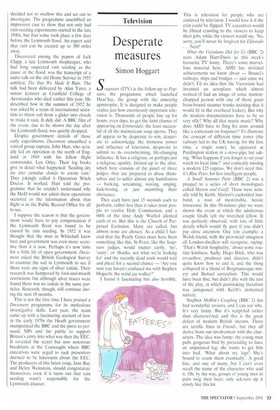Desperate measures
Simon Hoggart Soapstars (ITV) is the follow-up to Popstars, the programme which launched Hear'Say. the group with the annoying apostrophe. It is designed to make people realise just how enormously important television is. Thousands of people line up for hours, even days, to get the faint chance of appearing on Emmerd ale, the least successful of all the mainstream soap operas. They all appear to be desperate to win, desperate to acknowledge the immense power and influence of television, desperate to submit to its overwhelming, life-changing influence. It has a religious, or perhaps just a religiose, quality. Invited up to the altar, which here consists of the panel of three judges, they are prepared to abase themselves and to suffer almost any humiliation — barking, screaming, waving, singing, kick-boxing, or just mumbling their obeisance.
They each have just 15 seconds each to perform, rather less than it takes most people to receive Holy Communion, and a 60th of the time Andy Warhol allotted each of us. But this is the Church of Perpetual Exclusion. Many are called, but almost none are chosen. As a child I fancied that the Pearly Gates must have been something like this. St Peter, like the Soapstars judges, would mutter curtly, 'no', 'sorry', or 'thanks, not what we're looking for' and the recently dead souls would wail and plead for a second chance — 'Are you sure you haven't confused me with Stephen Hogarth, the serial jay-walker?'
I found it fascinating but also horrible.
This is television for people who are enslaved by television. I would love it if the coin could be flipped. TV executives would be filmed crawling to the viewers to keep their jobs, while the viewers would say, 'No, sorry, you'll never be forgiven for Eldorado . . Next!'
What the Victorians Did for Us (BBC 2) stars Adam Hart-Davis as this week's favourite TV loony. There's some marvellous material here. AHD has revisited achievements we knew about — Brunel's railways, ships and bridges — and some we didn't. I'd no idea that the Victorians had invented an aeroplane which almost worked (1 had an image of some muttonchopped person with one of those great brass-bound steamer trunks insisting that it would fit in the overhead locker). But why do modern documentaries have to be so very silly? Why all that manic music? Why does AHD have to fling his arms around like a contestant on Soapstars? To illustrate the concept of different time zones (the railways led to the UK having, for the first time, a single zone), he appeared at Paddington station in a stove-pipe hat asking, 'What happens if you forget to set your watch to local time?' and comically missing a modern 125 express. We don't need this; it's Blue Peter, for less intelligent people.
A Small Summer Party (BBC 2) was a prequel to a series of short monologues called Marion and Geoff. These were actually told by Keith, Marion's cuckolded husband, a man of inestimable, heroic innocence. In this 50-minute play we were shown the event at which the adulterous couple finally left the wretched fellow. It was perfectly observed, with lots of little details which would fly past if you didn't pay close attention. One tiny example: a Welsh friend, with the provincial smugness all London-dwellers will recognise, saying: 'That's Welsh hospitality,' about some routine kindness. Sadly, Hugo Buick. who was co-author, producer and director, didn't quite know how to end it, and the thing collapsed in a blend of Bergmanesque misery and Builuel surrealism. This would have been fine, but didn't jibe with the rest of the play, in which painstaking literalism was juxtaposed with Keith's demented naivety.
Stephen Moffat's Coupling (BBC 2) has had wonderful reviews, and I can see why. It's very funny. But it's script-led rather than character-led, and this is the great defect of modern British sitcoms. There are terrific lines in Friends, but they all derive from our involvement with the characters. The idea was funny; shy young man pulls gorgeous bird by pretending to have an amputated leg; she wants to get him into bed. 'What about my legs? She's bound to count them eventually'. A good line, and one of many, but I can't even recall the name of the character who said it. Oh, by the way, groups of young men in pubs swig their beer; only ack-tors sip it slowly like this lot.


































































 Previous page
Previous page